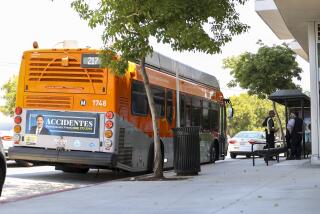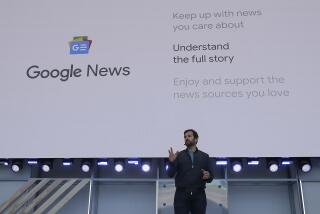Gore Unveils Internet Subsidy to Get Schools Online
In the San Fernando Valley neighborhood where the beating of motorist Rodney G. King in 1991 set off a chain of events leading to the Los Angeles riots, Vice President Al Gore trumpeted a package of government programs Saturday intended to boost community employment and educational access to the Internet.
Gore lauded the programs at Pacoima Elementary School, meeting with community representatives, talking to children in the school library about computers and the World Wide Web, and delivering a more formal speech in the school auditorium.
The government assistance, he said, represented “a little hand up, not a handout.”
Gore completed a three-day California tour Saturday intended to draw attention to the Clinton administration’s domestic agenda, a central focus of President Clinton’s State of the Union address Tuesday night. The trip was scheduled before the administration was engulfed by the controversy over whether the president engaged in a sexual relationship with a former White House intern, and Gore never mentioned that subject.
Under one already-established program, companies that initiate or increase operations in specified neighborhoods of Pacoima, South-Central, Boyle Heights, downtown, Watts, Firestone and Willowbrook are eligible for 10-year federal tax credits of $3,000 per person hired.
Under another, which Clinton will include in the budget proposal he unveils Monday, Los Angeles schools would be eligible for 90% discounts on the cost of connecting their computers to the Internet.
Acknowledging the Latino makeup of the Pacoima community, Gore briefly spiced his remarks with Spanish phrases, saying by way of encouragement, “querer es poder” and “si se puede,” which translate roughly to mean “where there’s a will there’s a way,” and “it can be done.”
The tax credit plan stems from the designation of the Los Angeles communities as empowerment zones, a phrase the Clinton administration has coined to encompass its efforts to channel federal money to impoverished communities with a focus on creating jobs.
The eligible communities, divided into neighborhood-sized federal census tracts, must demonstrate that at least 35% of their residents live below the established poverty rate, which is about $14,000 for a four-person family.
The Internet project is part of a nationwide $2.25-billion program for schools and libraries that Clinton will include in his fiscal 1999 budget request.
Its goal is to enable every classroom nationwide to be connected to the Internet by 2000, to put more modern computers and educational software in schools, and to train teachers to work as comfortably with computers as they do with chalkboards.
Sharing keyboard-and-mouse space in the library, Gore and a young student jointly submitted, electronically, an application for the reduced, education rate for Internet access. The depth of the discount, ranging from 20% to 90%, will be based on the financial strengths of the applying school districts.
City Councilman Richard Alarcon said industrial vacancies in Pacoima had fallen to 3% from a recession-era high of 12%. The tax credits “will have an immediate impact” in encouraging companies to boost employment, he said.
The poverty rate in the 2-square-mile area of Pacoima designated as an empowerment zone is 40%; the unemployment rate among the 13,000 residents is 18.4%, and among people ages 16 to 24, it is 55%.
Later in the day, Gore met privately with Steven Spielberg on a project the movie producer is developing to create a visual history of the Holocaust. The vice president also planned to drop by a dinner honoring long-time Democratic Party contributor Eli Broad.
Gore also planned to attend a dinner celebrating the opening of the California Science Center in Exposition Park, using the occasion to draw attention to a plan that would take advantage of computers’ capacity to store vast amounts of data to make available to students vivid images and detailed information about sites around the globe.
More to Read
Get the L.A. Times Politics newsletter
Deeply reported insights into legislation, politics and policy from Sacramento, Washington and beyond. In your inbox three times per week.
You may occasionally receive promotional content from the Los Angeles Times.










